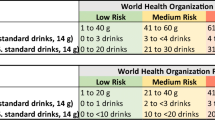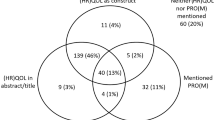Abstract
Aim
The aim of this study was to determine the influence of alcoholism on symptom expression, personalized symptom goal (PSG) and patient goal response (PGR), and patient global impression (PGI) in advanced cancer patients.
Methods
This was a secondary analysis of an international multicenter study. Advanced cancer patients who had a history of alcohol dependence positive, according to CAGE (cut down, annoy, guilt, eye-opener), were selected. Thirty patients (3.45%) were CAGE-positive. This sample was matched with 30 patients with similar characteristics who were CAGE-negative. Patients rated symptom intensity by using the Edmonton Symptom Assessment Score (ESAS) at admission (T0) and then after 1 week. For each symptom, patients reported their PSG. After a week of comprehensive palliative care, PSG was measured again (T7), as well as the achievement of PGR, and PGI. Minimal clinically important difference (MCID) was calculated by PGI of improvement or deterioration at T7 (bit better or a little worse, respectively).
Results
A significant decrease in intensity was found for most symptoms in both groups. In CAGE-negative and CAGE-positive patients, most patients had a PSG of ≤ 3 for all ESAS items as a target at T0. All PSG targets did not changed significantly after 1 week of palliative care in both groups. Although CAGE-positive basically had unfavorable PGI and PGR, a statistical significance was achieved only for appetite (P = 0.037; ANOVA test). In CAGE-negative patients, Karnofsky was the only factor independently associated with PGI for pain and dyspnea. Factors independently associated with PGI for nausea were symptom intensity at T0 and home situation. In CAGE-positive patients, Karnofsky was independently associated with PGI for pain, nausea, and well-being. Symptom intensity at T0 was independently associated with PGI for weakness.
Conclusion
CAGE-positive advanced cancer patients favorably responded to a palliative care intervention. No greater differences have been found in comparison with CAGE-negative patients for PSG, PGR, and PGI, except for appetite. Further studies with large number of patients could confirm some trends observed in this study.
Similar content being viewed by others
References
Mercadante S, Adile C, Caruselli A et al (2016) The palliative-supportive care unit in a comprehensive cancer center as crossroad for patients' oncological pathway. PLoS One 11(6):e0157300
Bruera E, Moyano J, Seifert L et al (1995) The frequency of alcoholism among patients with pain due to terminal cancer. J Pain Symptom Manage 10:599–603
Kim YJ, Dev R, Reddy A et al (2016) Association between tobacco use, symptom expression, and alcohol and illicit drug use in advanced cancer patients. J Pain Symptom Manage 51:762–768
Delgado-Guay MO, Osta E et al (2008) Alcoholism screening in patients with advanced cancer: impact on symptom burden and opioid use. J Palliat Med 11:964–968
Do KA, Johnson MM, Doherty DA et al (2003) Second primary tumors in patients with upper aerodigestive tract cancers: joint effects of smoking and alcohol (United States). Cancer Causes Control 14:131–138
Li Y, Mao Y, Zhang Y et al (2014) Alcohol drinking and upper aerodigestive tract cancer mortality: a systematic review and meta-analysis. Oral Oncol 50:269–275
Mercadante S, Porzio G, Caruselli A, Aielli F, Adile C, Girelli N, Casuccio A (2015) The frequency of alcoholism in patients with advanced cancer admitted to an acute palliative care unit and a home care program. J Pain Symptom Manage. 49:254–257
Mercadante S, Adile C, Ferrera P, Casuccio A (2017) The effects of alcoholism and smoking on advanced cancer patients admitted to an acute supportive/palliative care unit. Support Care Cancer 25:2147–2153
Giusti R, Mazzotta M, Verna L, Sperduti I, Di Pietro FR, Marchetti P, Porzio G (2018) The incidence of alcoholism in patients with advanced cancer receiving active treatment in two tertiary care centers in Italy. Alcohol Alcohol. https://doi.org/10.1093/alcalc/agy070
Lauridsen HH, Hartvigsen J, Manniche C et al Responsiveness and minimal clinically important difference for pain and disability instruments in low back pain patients. BMC Muscloskelet Disord 7:–82
Farrar JT, Portenoy RK, Berlin JA et al (2000) Defining the clinically important difference in pain outcome measures. Pain 88:287–294
Dalal S, Hui D, Nguyen L et al (2012) Achievement of personalized pain goal in cancer patients referred to a supportive care clinic at a comprehensive cancer center. Cancer. 118:3869–3877
Hui D, Park M, Shamieh O et al (2016) Personalized symptom goals and response in patients with advanced cancer. Cancer 122:1774–1781
Mercadante S, Adile C, Lanzetta G, Mystakidou K, Maltoni M, Soares LG, De Santis S, Ferrera P, Valenti M, Rosati M, Rossi R, Cortegiani A, Masedu F, Marinangeli F, Aielli F (2018) Personalized symptom goals and patient global impression on clinical changes in advanced cancer patients. Oncologist. https://doi.org/10.1634/theoncologist.2017-0668
Dev R, Parson HA, Palla S et al (2011) Undocumented alcoholism and its correlation with tobacco and illegal drugs use in advanced cancer patients. Cancer 117:4551–4556
Mercadante S, Adile C, Ferrera P, Cortegiani A, Casuccio A (2019 Jun) Symptom Expression In Patients With Advanced Cancer Admitted To An Acute Supportive/Palliative Care Unit With And Without Delirium. Oncologist. 24(6):e358–e364
Hui D, Shamieh O, Paiva CE et al (2015) Minimal clinically important differences in the Edmonton Symptom Assessment Scale in cancer patients: a prospective, multicenter study. Cancer 121:3027–3035
Parsons HA, Delgado-Guay MO, El Osta B et al (2008) Alcoholism screening in patients with advanced cancer: impact on symptom burden and opioid use. J Palliat Med 11:964–968
Tien AY, Schlaepfer TE, Fisch HU (1998) Self-reported somatization symptoms associated with risk for extreme alcohol use. Arch Fam Med 1:33–37
Author information
Authors and Affiliations
Corresponding author
Ethics declarations
Local institutional review boards at all participating centers approved the protocol, and written informed consent was obtained from all patients.
Conflict of interest
The authors declare that they have no conflicts of interest.
Additional information
Publisher’s note
Springer Nature remains neutral with regard to jurisdictional claims in published maps and institutional affiliations.
Rights and permissions
About this article
Cite this article
Mercadante, S., Adile, C., Ferrera, P. et al. Association between alcoholism and symptom expression, patient symptom goals, and clinical response in advanced cancer patients. Support Care Cancer 28, 3361–3369 (2020). https://doi.org/10.1007/s00520-019-05152-x
Received:
Accepted:
Published:
Issue Date:
DOI: https://doi.org/10.1007/s00520-019-05152-x




